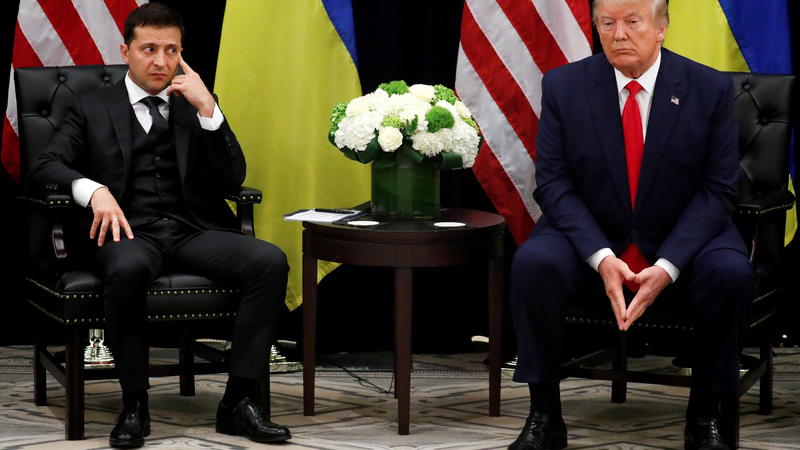Trump Labels Zelenskyy a ‘Dictator’: Escalating Tensions Between the U.S. and Ukraine
In a series of recent statements, U.S. President Donald Trump has intensified his criticism of Ukrainian President Volodymyr Zelenskyy, referring to him as a “dictator without elections” and accusing him of mishandling the ongoing conflict with Russia. These remarks have sparked a significant diplomatic rift between the two nations and raised concerns among international allies.
Trump’s Accusations Against Zelenskyy
On February 19, 2025, President Trump took to his social media platform, Truth Social, to express his disapproval of President Zelenskyy. In his post, Trump described Zelenskyy as a “modestly successful comedian” who had manipulated the United States into spending $350 billion on a war that “couldn’t be won” and “never had to start.” He further insinuated that Zelenskyy aimed to prolong the conflict for financial gain, stating, “Zelenskyy probably wants to keep the ‘gravy train’ going.”
These comments followed a press conference at Trump’s Mar-a-Lago residence, where he falsely claimed that Zelenskyy’s approval rating had plummeted to 4% and urged Ukraine to hold elections despite the ongoing martial law. Trump’s assertions have been widely debunked; recent polls indicate that 57% of Ukrainians trust President Zelenskyy, a figure that has remained relatively stable throughout the conflict.
Shifts in U.S. Foreign Policy
Since his inauguration in January 2025, President Trump has markedly shifted U.S. foreign policy to adopt a more conciliatory stance toward Russia. This realignment has included high-level negotiations with Russian officials, often excluding Ukrainian representatives, and public statements suggesting that Ukraine bears responsibility for the conflict. In a recent address, Trump suggested that Ukraine “could have made a deal” to prevent the war, a narrative that aligns closely with Russian propaganda.
Defense Secretary Pete Hegseth echoed this sentiment, describing Ukraine’s goal of reclaiming all its territory as “illusionary” and advocating for a “realistic assessment of the battlefield.” These positions have alarmed European allies, who view them as premature concessions to Russian aggression.
International Reactions
European leaders have expressed significant concern over the U.S.’s recent policy shifts and rhetoric. German Chancellor Olaf Scholz responded to Trump’s characterization of Zelenskyy as a dictator by stating, “It is simply wrong and dangerous to deny President Zelenskyy democratic legitimacy.” Scholz emphasized that the suspension of elections in Ukraine is constitutionally justified due to the ongoing martial law.
The exclusion of Ukraine from recent U.S.-Russia negotiations has further strained relations. Ukrainian officials have criticized the U.S. for sidelining them in discussions directly impacting their nation’s sovereignty and future. This diplomatic marginalization has prompted Ukraine to seek stronger support from European allies, who have reaffirmed their commitment to Ukraine’s sovereignty and territorial integrity.
Domestic Criticism and Fact-Checking
President Trump’s statements have faced scrutiny and criticism within the United States. Fact-checkers have highlighted multiple inaccuracies in his claims. For instance, Trump’s assertion that the U.S. has spent $350 billion on the Ukraine conflict is unsubstantiated; reports indicate that the actual figure is significantly lower. Additionally, his claim that Zelenskyy admitted to half of the U.S. aid being “missing” has been debunked, with no such admission made by the Ukrainian president.
Critics argue that Trump’s rhetoric undermines the longstanding alliance between the U.S. and Ukraine and could embolden Russian aggression. There are concerns that these policy shifts may lead to a destabilization of the region and a weakening of NATO’s collective security framework.
Implications for the Russia-Ukraine Conflict
The Trump administration’s recent actions and statements suggest a potential realignment of U.S. foreign policy in Eastern Europe. By adopting a stance that appears more sympathetic to Russian interests, the U.S. risks alienating its allies and undermining the international coalition supporting Ukraine. This shift could have far-reaching consequences, potentially emboldening Russia to pursue more aggressive actions in the region.
Furthermore, the portrayal of President Zelenskyy as a dictator not only misrepresents the political realities in Ukraine but also serves to delegitimize its leadership at a critical juncture. Such rhetoric may weaken Ukraine’s negotiating position and morale, complicating efforts to achieve a peaceful resolution to the conflict.
Conclusion
President Trump’s recent remarks regarding President Zelenskyy and the ongoing conflict in Ukraine have introduced new tensions into U.S.-Ukraine relations and raised concerns among international allies. As the situation continues to evolve, the global community will be closely monitoring the implications of these developments on regional stability and the broader geopolitical landscape.

